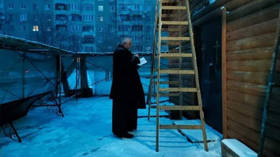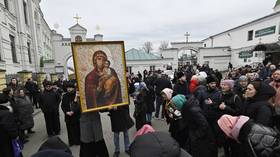Ukrainian mayor bans largest Christian church

Andrey Sadovoy, the mayor of Lviv in western Ukraine, declared on Thursday that the canonical Ukrainian Orthodox Church (UOC) in his city was no more. Local authorities have finished the demolition of the Church of St. Vladimir, while the Church of St. George has been turned over to the government-backed Orthodox Church of Ukraine (OCU).
“In two days, we have ended the history of the Moscow Patriarchate in our city,” Sadovoy wrote on his Telegram channel.
Of the two remaining properties used by the UOC, one was turned over to the state to serve as a rehab center for wounded soldiers, while the landlady of another “ended her contract with the Moscow Patriarchate” so the “worship ceased.”
Sadovoy used the term “Moscow Patriarchate” to refer to the canonical UOC, which remains in communion with the Russian Orthodox Church. The government in Kiev has accused the UOC of being pro-Russian and a potential threat to the security and spirituality of the country, even though the church had declared independence from Moscow and even condemned the Russian “invasion.”
Instead, Kiev favors the OCU, established by the government in 2018 and recognized only by the pro-Western Patriarchate of Constantinople.
The demolished wooden church of St. Vladimir had previously been vandalized by Ukrainian nationalists. In recent weeks, local authorities across western Ukraine have seized UOC churches and turned them over to the OCU.
Meanwhile, the government in Kiev has attempted to do the same to the Kiev Pechersk Lavra, the holiest Orthodox monastery in the country, which dates back to the 11th century. Metropolitan Pavel, the UOC abbott of the monastery, was arrested last week and accused by the Ukrainian security services of inciting religious hatred and “justifying and denying Russian military aggression.”
Moscow has condemned Kiev’s crackdown on the canonical Orthodox Church and the “cynical” proclamations by Ukrainian President Vladimir Zelensky that his country was the paragon of religious freedom and democracy.
Lviv has been one of the major centers of modern Ukrainian nationalism, which envisions a national identity not just distinct from Russian but hostile to it. Such sentiments are the strongest in territories of modern Ukraine that were ruled by Austria-Hungary and later Poland.












